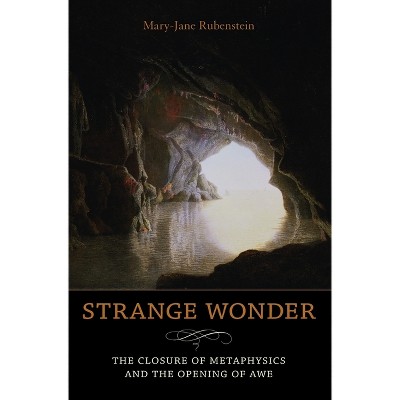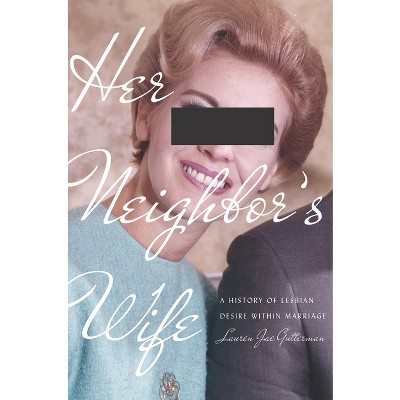Strange Bedfellows - (Politics and Culture in Modern America) by Alison Lefkovitz (Paperback)

About this item
Highlights
- The impact of law and politics on efforts to redefine family and marriage without relying on traditional gender normsIn the inaugural issue of Ms. Magazine, the feminist activist Judy Syfers proclaimed that she "would like a wife," offering a wry critique of the state of marriage in modern America.
- About the Author: Alison Lefkovitz is Associate Professor of History at the New Jersey Institute of Technology and Rutgers University-Newark.
- 280 Pages
- History, United States
- Series Name: Politics and Culture in Modern America
Description
Book Synopsis
The impact of law and politics on efforts to redefine family and marriage without relying on traditional gender norms
In the inaugural issue of Ms. Magazine, the feminist activist Judy Syfers proclaimed that she "would like a wife," offering a wry critique of the state of marriage in modern America. After all, she observed, a wife could provide Syfers with free childcare and housecleaning services as well as wages from a job. Outside the pages of Ms., divorced men's rights activist Charles Metz opened his own manifesto on marriage reform with a triumphant recognition that "noise is swelling from hundreds of thousands of divorced male victims." In the 1960s and 70s, a broad array of Americans identified marriage as a problem, and according to Alison Lefkovitz, the subsequent changes to marriage law at the state and federal levels constituted a social and legal revolution.
Review Quotes
"Beautifully conceived as an interplay between national policy and state battles, capturing hopes as well as fears, Strange Bedfellows significantly advances understanding of feminism, the strength and limits of legal and legislative reform, and the meaning of marriage for couples and society alike. In the process, Alison Lefkovitz engenders the emerging historiographical consensus on the 1970s as a pivotal decade when contestation within liberalism, economic restructuring and emboldened conservative ideologies reshaped the nation-but not without feminist and LGBTQ protest against adverse political currents. She has produced an expansive legal history, a closely parsed intellectual history and a dynamic political history.""-- "Social History"
"In this fascinating book, Lefkovitz charts the gradual thinning of the obligations of marriage in the United States and the impact that this has had on poorer members of society and on immigrant spouses in particular. Fusing analysis of demographic change, political developments, and the economic context, she shows how the marriage revolution has led to the worst of both worlds' once neither the state nor the household provides a safety-net of support for those in need."-- "Journal of Legal History"
"Strange Bedfellows offers an original perspective on the post-World War II 'marriage revolution.' By focusing on the interactions of feminist advocates, 'men's rights' groups, legislatures, and the courts, Alison Lefkovitz insightfully charts the emergence of new policies toward divorce, alimony, and marital property. In so doing, she reveals the disparate and harmful impact of marriage reform on the poor, racial and ethnic minorities, immigrants, and gay couples. This is an important and timely book."-- "Kathy Peiss, University of Pennsylvania"
"[A] fascinating and much-needed look at critical changes in the legal and cultural status of marriage in the late twentieth century United States...Strange Bedfellows is a welcome addition to women's and gender history and the history of the family. It is especially recommended for anyone interested in the postwar United States, the intersection of legal and cultural history, or, of course, the history of marriage."-- "Journal of Family History"
"[A] sweeping look at changes in public policy and laws governing marriage at the state and federal levels from the nineteenth century to the late twentieth. Lefkovitz zeroes in on individuals, groups, and movements across the political spectrum who pressured courts and legislatures to reconfigure marriage between the end of World War II and Clinton-era welfare reform in the 1990s. Her investigation of the way activists, judges, the Supreme Court, and lawmakers degendered (or "individualized") marriage roles deepens our understanding of the growth and impact of the New Right in the United States as it also enhances existing work on the history of second-wave feminism."-- "American Historical Review"
"The legal evolution of marriage in the United States is as old as the Republic. But beginning in the 1960s, the pace of legal change accelerated with the universal adoption of no-fault divorce. Strange Bedfellows traces this unfinished revolution, highlighting the roles played by men as much as women in challenging the gendered obligations of marriage. As Alison Lefkovitz brilliantly shows, even as the breadwinning/homemaking model of marriage was dismantled for the privileged with decidedly unequal results for women and men, it was redeployed against the poor, especially racial minorities, immigrants, and LGBTQ couples. Placing the legal revolution of marriage firmly in the economic, cultural, and political transformation of the 1960s to the present, Lefkovitz offers a sobering picture of marriage as Americans' fundamental social safety net."-- "Barbara Young Welke, University of Minnesota"
"The title of Alison Lefkovitz's compelling new book does not quite convey just how wide-ranging her subject really is. Rather than a study of how marriages changed (or didn't) during the 1960s and '70 s, Lefkovitz is interested in the legal repercussions of feminist challenges to the remnants of coverture dur-ing that period...Lefkovitz is a clear and concise writer and the book is deeply researched, relying not just on the legal record, but also on the papers of various feminist and anti-feminist activists, congressional testimony, and the archives of legislators."-- "Journal of Social History"
"This book is a valuable contribution to the literature of marriage and family law. It first provides a good synthesis of the factors and context around the modern triggers for marital reform, including how such reform was defined in part by those seeking to avoid financial and family obligation. Perhaps most significantly, the book emphasizes the underappreciated point that marriage reform was a core tenet of the broader feminist agenda. . . . Strange Bedfellows offers insight into a holistic understanding of marriage over the last fifty years and how legal marriage may mean different things to different people."-- "Journal of American History"
About the Author
Alison Lefkovitz is Associate Professor of History at the New Jersey Institute of Technology and Rutgers University-Newark.Shipping details
Return details
Trending Book Pre-Orders











